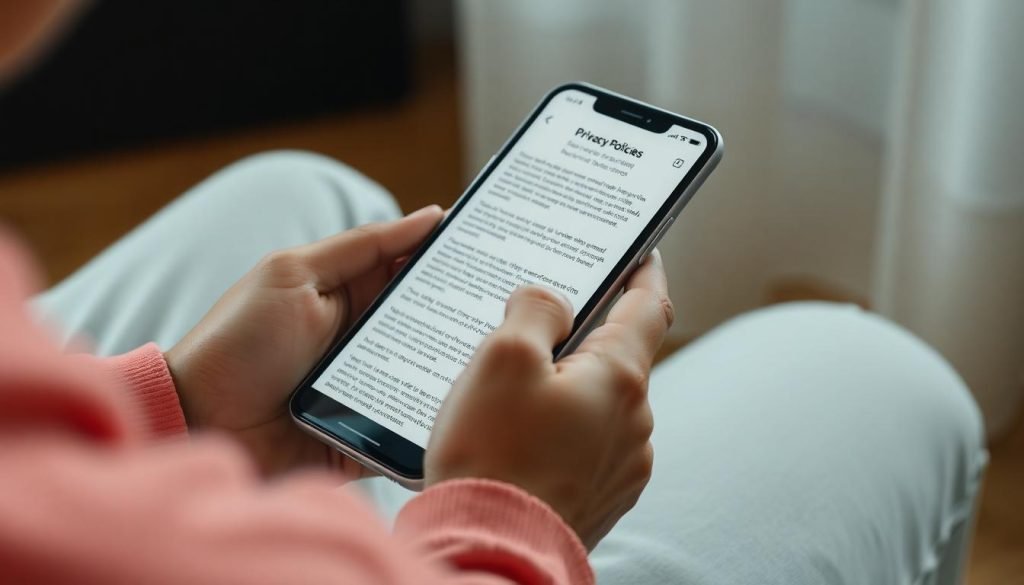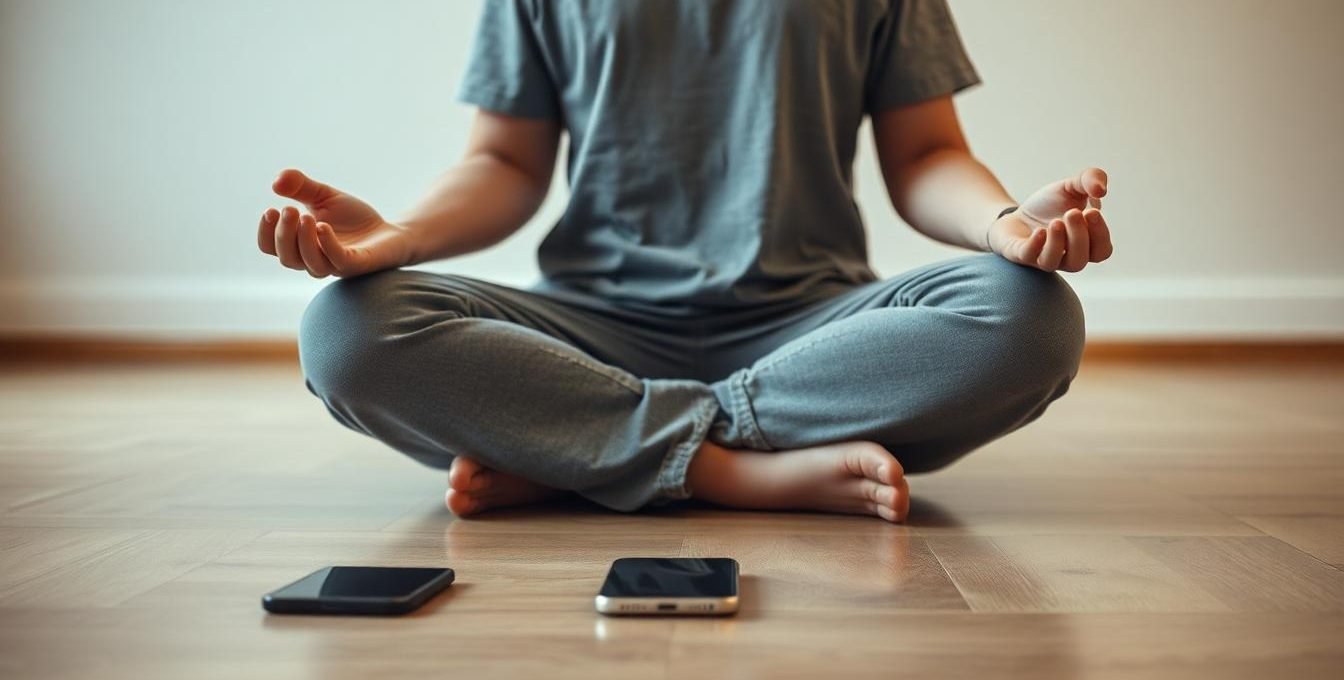The pursuit of balance and clarity has become a top priority for many people. Meditation apps with statistics combine technology, self-care, and data in a single place—bringing more control to those who truly want to know themselves. These tools display your progress through simple graphs, charts, and reports, helping you notice every small daily win.
With a meditation app that includes statistics, I can clearly see how much time I dedicate to my well-being, recognize improvements in focus, sleep, and energy, and make adjustments whenever needed. For those who have tried to build the habit and ended up quitting, visual results offer real motivation to keep going. All of this comes with practical, accessible features designed to transform your routine and the way you care for your mind.
What Are Meditation Apps with Statistics?
Meditation apps with statistics elevate the self-care experience by providing clear data on your progress. In my experience, these apps show more than just the minutes meditated—they reveal patterns, trends in my well-being, and even daily micro-victories. The information is presented as graphs, reports, and alerts, building a visual dashboard of my growth over the weeks. This makes a huge difference for people who appreciate tangible results and like to track their evolution. But what really sets them apart are the details in each feature. Let’s take a closer look at the functionality and some examples of apps that go far beyond the basics.
Features That Go Beyond the Basics
The best meditation apps with statistics aren’t limited to simple timers or recorded audio sessions. They invest in features that personalize the experience, boost motivation, and give you a clearer picture of your progress. Here are some of the most valuable tools:
- Diverse guided sessions: Choose from meditations focused on anxiety, focus, sleep, gratitude, and more—often organized into progressive programs with different durations
- Detailed reports: Daily, weekly, and monthly stats. Most apps include graphs for total time meditated, frequency, mood before and after sessions, and regularity logs
- Integration with smart devices: Apps like Aura and Glo sync with smartwatches and fitness trackers to collect health data such as heart rate, sleep hours, and even emotional variations
- Goal customization: The biggest motivation comes from visible goals. You can set targets for consecutive practice days or minutes per week, earning virtual rewards or getting reminders when you miss a day
- Smart notifications and reminders: Beyond classic alarms, many apps use AI to suggest optimal meditation times based on when you’re usually more stressed or distracted
- Mood tracking and emotional journaling: Tools that let you log how you feel before and after meditating, building a timeline of your emotions
These features help you understand which practices work best for you, which times of day bring more benefits, and how meditation is influencing areas like sleep, focus, and emotional balance.
PriTop Meditation Apps with Statistics – Brazilian and Global
The meditation app market has grown rapidly, offering both national and international options that stand out for their details and progress-tracking capabilities:
Aura: Meditation & Sleep (International)
Globally awarded, Aura provides guided meditations, soundscapes, breathing exercises, and a complete monitoring system. Reports include:
- Consecutive practice days
- Stress and mood levels recorded before and after each session
- Total time meditated and weekly/monthly trends
- Integration with Apple Health and Google Fit
Based on your data, Aura suggests new practices and tailors recommendations to your needs.
Glo (International)
Glo goes beyond meditation, combining Yoga, Pilates, and breathwork with clear stats. It displays progress by category, time spent in each practice, active days, and monthly performance averages. It syncs with wearables and presents easy-to-understand visual graphs.
YouTuneIn – Binaural Meditation (International)
Focused on brainwave states like Theta, Delta, and Alpha, YouTuneIn offers over a thousand customizable tracks. Users can monitor:
- Which frequencies induce the most relaxation
- Reports on completed sessions and perceived effects
- Logs for energy levels and mental clarity
SleepUp (Brazil)
Specialized in sleep and anxiety, this app blends educational content with sleep-focused meditations. It includes dashboards showing:
- Nightly meditation duration
- Self-reported sleep quality
- Weekly evolution of bedtime routines
It also gives individual recommendations based on your sleep pattern.
GPS MED (Brazil)
This multidimensional health platform includes mindfulness practices and breathing exercises, with features like:
- Mood tracking
- Clinical symptom logs
- Adherence to routines
User profiles evolve over time, generating wellness and engagement indicators.
Insight Timer (International – available in Portuguese)
One of the most popular, Insight Timer offers groups, themed meditation series, and detailed statistics:
- Monthly hours meditated
- Active days tracked
- Challenge progress (e.g., 30-day streaks)
Its greatest asset is the built-in community, which encourages users to stay consistent and share their journeys.
These meditation apps with statistics not only promote self-awareness but also give a clear, real-time map of your progress. I can visualize my data, reflect, and improve—because I can literally see how daily actions build a more conscious life. With that, maintaining a healthy habit becomes simpler and more rewarding.
Meditation App Market Statistics

The market for meditation apps with statistics is growing fast and remains strong heading into 2025. With more people seeking mental wellness, this segment has become one of the main pillars of the digital well-being industry. Recent data shows that demand, usage time, and user engagement continue to break records. Millions of users of all ages across many countries are choosing apps that actually deliver data and metrics to support personal growth.
Who Are the Main Users—and Why Are They Using These Apps?
Meditation apps with statistics attract a wide variety of users, but one profile stands out: young adults between 18 and 34 years old lead the way, making up 45% of the global market in 2025. Adults aged 35 to 54 come next, with about 35% of users. This is no surprise—this generation values digital tools, enjoys tracking results, and seeks practical solutions to manage demanding routines.
The most common motivations for using these apps include:
- Stress and anxiety relief: In fast-paced times, mental control is a top priority. Statistics make self-care measurable.
- Improved sleep quality: Many users track sleep patterns, find what works best for them, and compare progress.
- Focus and productivity: For those working or studying, charts help define the best timing and strategies for breaks.
- Emotional balance: Mood tracking features help identify stress spikes or calmer periods.
- Habit building and maintenance: Tracking streaks, time meditated, or small wins serves as positive reinforcement and increases daily motivation.
And this data isn’t just for curiosity. Many people use app statistics to:
- Share progress in online communities
- Justify lifestyle changes or present their history to a therapist or health professional
- Motivate friends and family, turning self-care into a shared goal
- Adjust their practices in real time based on measurable feedback
Regional Insights and Global Adoption
North America and Europe are the largest markets, reaching over 60% penetration among the adult population. Asia-Pacific is growing rapidly, fueled by public mental health initiatives and culturally adapted content.
Key Numbers on Impact and Efficiency
By 2025, the number of global meditation app users has surpassed 300 million. In the last five years alone, the average annual growth rate has been about 20%, driven by the need for mental health tools, easy-to-use technology, and widespread mobile access.
Highlights:
- Average session duration: between 8 and 12 minutes—showing high adherence even in busy routines
- 88% of users report emotional well-being improvement after one month of regular use, according to global studies (Headspace and Calm show similar data)
- Apps with detailed statistics show higher weekly return rates (~70%) than basic meditation apps (~45%)
- Apps connected to smart devices (e.g., fitness trackers, heart monitors) see a 15% increase in user consistency, capturing real-time heart rate, sleep quality, and relaxation patterns
- Average app rating: 4.7 stars on platforms like Google Play and the App Store, reflecting user satisfaction with clear results and ease of use
Researchers also highlight that personalization, gamification (challenges, achievements), and visual feedback significantly enhance motivation and reduce dropout rates over the long term.
The global meditation app market with built-in statistics is already valued at over $8 billion, with forecasts predicting it will double by the end of the decade. With the integration of virtual reality, AI, and biofeedback (real-time emotion/stress monitoring), the future of mental care is becoming more individualized and effective.
Key Trends and Leading Segments
Some of the top trends shaping the meditation app landscape include:
- Apps integrated with wearables: A major success due to their ability to deliver accurate, cross-referenced data (mind and body)
- VR-based therapies: Immersive meditation sessions are growing at over 19% per year, especially among young adults
- Adoption in emerging markets: Latin America and Southeast Asia are advancing quickly thanks to wider internet access and more affordable smartphones
- Focus on specific conditions: Apps designed for anxiety, depression, or cognitive difficulties are gaining ground and are even being recommended by health professionals
As access grows, scientific validation becomes a priority. Independent research and quality rating systems like the Mobile App Rating Scale (MARS) help maintain high standards for privacy and actual impact—both for casual users and those seeking therapeutic support or behavior change.
What once seemed like a wellness trend is now a measurable tool. Meditation apps with statistics deliver real results: higher engagement, strong user reviews, and a sense of control—right in the palm of your hand.
How to Choose the Right Meditation App with Statistics for Your Profile

Choosing the right meditation app with statistics can make all the difference in your self-care routine. It’s like picking a comfortable pair of shoes: it should fit your lifestyle, keep up with your pace, and above all, protect what matters most—your data and mental well-being. Knowing which criteria to look for helps make the process more conscious and secure. Based on my experience, here are the most practical points to consider:
Privacy and User Data Protection
A feature-rich app means little if it doesn’t take privacy seriously. With growing app usage in Brazil and around the world, data protection has become a central concern. In Brazil, the LGPD (General Data Protection Law) requires companies to be transparent about how they collect, store, and use personal information. So, don’t just fall for nice branding or wellness buzzwords—look behind the scenes.
When comparing meditation apps with statistics, watch for:
- Read the privacy policy carefully: A good app clearly explains what data it collects, how it’s used, and who it may be shared with
- Permissions requested: Avoid apps that ask for unnecessary access like precise location, contacts, or microphone—unless it’s essential for functionality
- Anonymity and control: Choose apps that let you stay anonymous or control what information is shared
- Storage of sensitive data: Give preference to apps that use encryption and visible security measures, especially for mental health logs, mood journals, or emotional records
- Frequent updates and customer support: Reliable apps offer regular updates and clear support channels
- LGPD and international compliance: Trustworthy apps display certifications, seals, or references to data protection regulations
Protecting your personal development journey means protecting your data. Privacy is a right—and a foundation for trust in any digital wellness tool.
Tips to Make the Most of Your Meditation App Statistics
Access to statistics isn’t enough—you need to turn those numbers into actions that support your personal growth. The data should serve you, offering clarity and fueling motivation, rather than becoming another source of pressure.
Here’s how I get the most value out of the statistics in a meditation app with tracking:
- Set realistic, personal goals: Instead of comparing yourself to others, focus on small wins and consistency. This could mean meditating for 5 minutes daily or completing three sessions per week.
- Review reports regularly: Take a moment each week to observe trends in time spent, session frequency, and mood variations. This deepens self-awareness and helps you tweak your routine if needed.
- Adjust based on your performance: If certain times or types of meditation bring better results, try experimenting. Flexibility is key to progress.
- Use automatic insights: Many apps offer alerts, suggestions, and performance comparisons. Take advantage of these features to spot patterns—but don’t turn tracking into obsession.
- Celebrate small victories: Recognize when you stick to a streak or when data shows better sleep or focus. Positive reinforcement strengthens the habit.
- Use reminders and notifications: Set gentle nudges to help maintain regularity without demanding perfection—your routine is yours, so shape it accordingly.
- Leverage your history in therapy: If you see a psychologist or therapist, having detailed reports on hand can help them understand your context and offer more tailored guidance.
These practices make the experience more enjoyable and effective, with statistics becoming true allies on your self-awareness journey—not just abstract numbers. Choosing the right app, protecting your data, and learning to interpret your reports can turn a meditation tracker into a real path to personal growth.
Conclusion
Meditation apps with statistics have become my daily ally in maintaining balance. With real-time data, I’ve noticed genuine improvements in my focus, sleep quality, and emotional control.
These tools prove that growth goes beyond relaxation—meditation is also about understanding your patterns and building consistent habits. When I can track every small improvement, my motivation rises and engagement becomes part of my everyday life.
Choosing the right meditation app with statistics transforms self-care into something practical and personalized, respecting my privacy and my needs. Thanks to advances in technology, the experience is now safer, more integrated, and easier than ever.
Pick the app that best fits your lifestyle and take that first step. Your well-being deserves present, intelligent attention. Thanks for reading—feel free to share your experience and keep exploring new ways to transform your mind.






Deixe um comentário